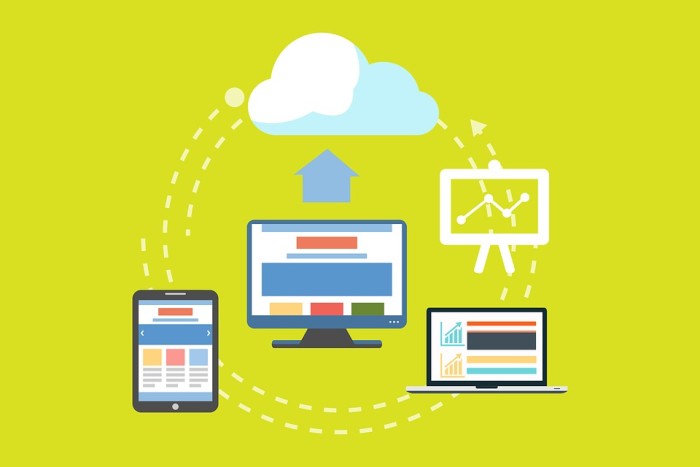
Every business needs a phone to enable communication with customers. See how you can leverage the cloud by using a virtual phone system to serve your customers better.
“Daddy, what are clouds made of?”
“Linux servers mostly.”
There was a time that if you wanted to start your own web-based company, you had to factor in costs for physical resources which involved servers and racks, network pipes, ISDN lines, and whatnot. You had to have a space dedicated to all the hardware equipment necessary to power your business.
Today, none of that is necessary. You can simply logon to your Amazon account, spin up Amazon’s web service, and you’re good to go. You don’t have to go through the mental and physical hassle of looking for office space, and computing hardware and maintenance costs.
As much as many of us still love to hang on to our physical servers, it often doesn’t make sense to have an in-house data center. To get a clear picture, compute and compare the capital expense of running your own hardware versus the operational expense of using the cloud.
Small businesses with growing revenue are 50% more likely to prefer IT cloud delivery, and they’ve reported having experienced enhanced security and higher productivity.
For business owners who are not much familiar with the Cloud, making the move may seem daunting. Let’s look at the main benefits that the cloud offers to nudge you along the way.
1) Ease of setup
When it comes to running your business on the Cloud, the only pieces of hardware you’d initially require are your desktop/laptop and a device that provides you internet connectivity. For in-house setups, you would need to have a dedicated IT team to setup, maintain and manage all the required resources to run your business. With the Cloud, you need to account only for the cloud services and need not worry about staffing, maintenance or other such challenges.
Also, you need not worry about the maintenance of hardware, software, and network when it comes to the cloud, as the cloud provider is responsible for that. Being a small business, you typically might not have an idea of what your actual IT requirements are. In such a case, the cloud is your best option as you can start off with minimal requirements and scale as you grow.
2) Cost-effective
If you’re a business that houses hardware on-premise, you’d know how cumbersome the process of running and maintaining it would be. With an in-house data center, although your infrastructure is available and running 24/7/365, is it always utilized effectively?
The answer is always a definite ‘No’. The costs on the power required to run the servers alone would be phenomenal, especially when it’s over a lengthy time period. And if your business is growing at a rapid pace, you’d need to upgrade the infrastructure to keep up with it, incurring more costs.

Having an in-house data center would be great if you could power off the servers when they are not in use, but that’s hardly possible. Even if you could turn them off, you’d only be able to save on electricity, but you’d still have to pay for the space that they occupy.
This is where cloud integration could help you. It increases the operational efficiency of a business substantially. It offers you the ability to turn off any instance at any minute, and you can even schedule it ahead of time. SaaS applications on the cloud are all subscription-based, which means you can avoid spending huge amounts on long-term contracts. You can sign up for a month initially, see how it works out, and then jump in for the long haul if it suits you.
3) Improved collaboration and work flexibility
Gone are the days when you had to send documents back and forth between each other to edit and revise them. With the cloud, all the files will be centralized in one place, so that multiple people can access it simultaneously, and get more done, more quickly. This helps you streamline your work process and help increase productivity. When your team can access, edit and share information quickly, they’ll be able to do more together in a seamless manner. This helps increase collaboration and improve the overall work experience.
Collaboration nowadays also doesn’t mean that your entire team must be in the same office space. One huge benefit of the cloud is in its ability to provide collaboration on a global scale; no matter how geographically diverse your team is, you can get the work done at the same time as if you were in the same space. Cloud-based systems provide access from anywhere, which enables your business to have total flexibility. Your team can work from their home, or any other remote location, as long as they have an internet connection. Also, this helps you cut down on costs as you don’t have to purchase workstations for all. You can ask a few of your employees to work from home on their own devices.
4) Scalability
The traditional way to deal with a surge in demand is to purchase additional servers and keep them as a reserve. Considering that it sometimes takes years for a business to grow, those servers would be sitting idle in one corner wasting precious office space. You also have to factor in hardware degradation due to non-usage, leading to wasted revenue.
Cloud computing offers you the ability to rapidly scale your resources up/down and in/out. You can choose to have as many or as few resources as required without having to know your exact capacity upfront. When you scale up/down, you are altering the power of the instance, maybe increasing the CPU power to scale up. When scaling in/out, you are adding/removing the number of instances associated with your account. This kind of scaling is possible only because the cloud provides on-demand resourcing, you cannot scale this quickly or easily when you have an on-premise data center.
5) Data security
Contrary to the widely held belief that the cloud is not as secure as on-premise systems, this study by Office365 has identified that 94% of small businesses report enhanced security benefits after moving to the cloud. Breaching of security at your data center could lead to all information being stolen, whereas with the cloud, you have the option to remotely wipe your data as soon as a breach is detected. And you don’t have to worry about losing your data, as you can remotely move your data to a different account that isn’t compromised.
The cloud offers more security benefits than many business owners realize. Employees’ laptops usually pose a greater threat than data being stored in the cloud. If laptops are stolen, critical data can easily be retrieved from the hard drive. However, if all your data is on the cloud, a stolen laptop wouldn’t be of much concern as the thief still needs to log on to the cloud account to retrieve information.
The two most popular cloud vendors – AWS and Microsoft Azure, have to operate at the maximum level of security to comply with regulations. As a result, other small businesses using the same public cloud benefit from these security measures as well.
Concluding thoughts
Cloud computing is no more just a buzzword. The cloud revolution has powered remote working, and businesses are gravitating towards the technology now more than ever because of the kind of freedom and flexibility it provides. The host of benefits that it offers far outweigh the conventional on-premise models.
Moving to the cloud can help you serve your customers better. You can leverage cloud phone systems to drive better customer engagement and satisfaction. Unlike landline phones, virtual phone system are not tied down to hardware and you can use them flexibly as per your requirement. Your team can use a laptop, mobile phone or any internet-connected device to attend to your customers quickly and effectively.
